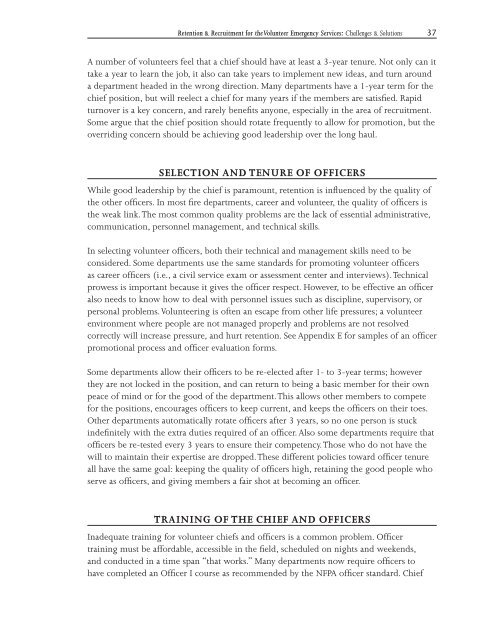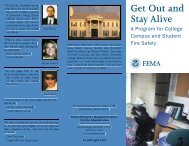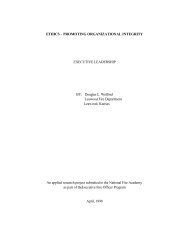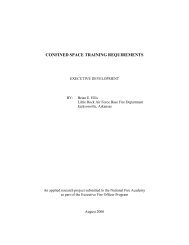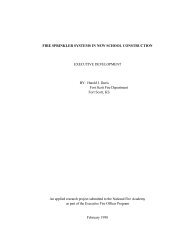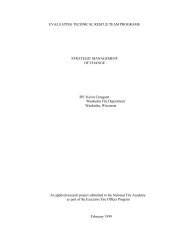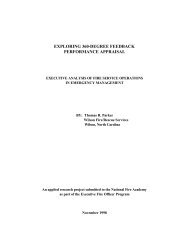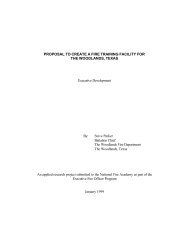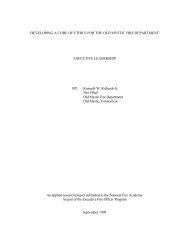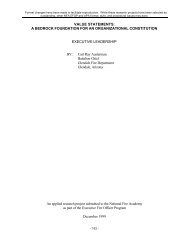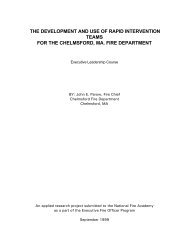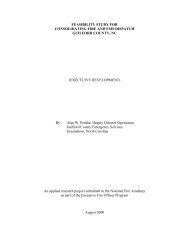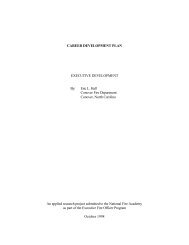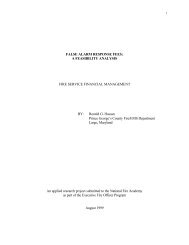Retention and Recruitment for the Volunteer Emergency Services
Retention and Recruitment for the Volunteer Emergency Services
Retention and Recruitment for the Volunteer Emergency Services
Create successful ePaper yourself
Turn your PDF publications into a flip-book with our unique Google optimized e-Paper software.
<strong>Retention</strong> & <strong>Recruitment</strong> <strong>for</strong> <strong>the</strong> <strong>Volunteer</strong> <strong>Emergency</strong> <strong>Services</strong>: Challenges & Solutions 7<br />
A number of volunteers feel that a chief should have at least a 3-year tenure. Not only can it<br />
take a year to learn <strong>the</strong> job, it also can take years to implement new ideas, <strong>and</strong> turn around<br />
a department headed in <strong>the</strong> wrong direction. Many departments have a 1-year term <strong>for</strong> <strong>the</strong><br />
chief position, but will reelect a chief <strong>for</strong> many years if <strong>the</strong> members are satisfied. Rapid<br />
turnover is a key concern, <strong>and</strong> rarely benefits anyone, especially in <strong>the</strong> area of recruitment.<br />
Some argue that <strong>the</strong> chief position should rotate frequently to allow <strong>for</strong> promotion, but <strong>the</strong><br />
overriding concern should be achieving good leadership over <strong>the</strong> long haul.<br />
selection <strong>and</strong> tenure of officers<br />
While good leadership by <strong>the</strong> chief is paramount, retention is influenced by <strong>the</strong> quality of<br />
<strong>the</strong> o<strong>the</strong>r officers. In most fire departments, career <strong>and</strong> volunteer, <strong>the</strong> quality of officers is<br />
<strong>the</strong> weak link. The most common quality problems are <strong>the</strong> lack of essential administrative,<br />
communication, personnel management, <strong>and</strong> technical skills.<br />
In selecting volunteer officers, both <strong>the</strong>ir technical <strong>and</strong> management skills need to be<br />
considered. Some departments use <strong>the</strong> same st<strong>and</strong>ards <strong>for</strong> promoting volunteer officers<br />
as career officers (i.e., a civil service exam or assessment center <strong>and</strong> interviews). Technical<br />
prowess is important because it gives <strong>the</strong> officer respect. However, to be effective an officer<br />
also needs to know how to deal with personnel issues such as discipline, supervisory, or<br />
personal problems. <strong>Volunteer</strong>ing is often an escape from o<strong>the</strong>r life pressures; a volunteer<br />
environment where people are not managed properly <strong>and</strong> problems are not resolved<br />
correctly will increase pressure, <strong>and</strong> hurt retention. See Appendix E <strong>for</strong> samples of an officer<br />
promotional process <strong>and</strong> officer evaluation <strong>for</strong>ms.<br />
Some departments allow <strong>the</strong>ir officers to be re-elected after 1- to 3-year terms; however<br />
<strong>the</strong>y are not locked in <strong>the</strong> position, <strong>and</strong> can return to being a basic member <strong>for</strong> <strong>the</strong>ir own<br />
peace of mind or <strong>for</strong> <strong>the</strong> good of <strong>the</strong> department. This allows o<strong>the</strong>r members to compete<br />
<strong>for</strong> <strong>the</strong> positions, encourages officers to keep current, <strong>and</strong> keeps <strong>the</strong> officers on <strong>the</strong>ir toes.<br />
O<strong>the</strong>r departments automatically rotate officers after 3 years, so no one person is stuck<br />
indefinitely with <strong>the</strong> extra duties required of an officer. Also some departments require that<br />
officers be re-tested every 3 years to ensure <strong>the</strong>ir competency. Those who do not have <strong>the</strong><br />
will to maintain <strong>the</strong>ir expertise are dropped. These different policies toward officer tenure<br />
all have <strong>the</strong> same goal: keeping <strong>the</strong> quality of officers high, retaining <strong>the</strong> good people who<br />
serve as officers, <strong>and</strong> giving members a fair shot at becoming an officer.<br />
training of <strong>the</strong> chief <strong>and</strong> officers<br />
Inadequate training <strong>for</strong> volunteer chiefs <strong>and</strong> officers is a common problem. Officer<br />
training must be af<strong>for</strong>dable, accessible in <strong>the</strong> field, scheduled on nights <strong>and</strong> weekends,<br />
<strong>and</strong> conducted in a time span “that works.” Many departments now require officers to<br />
have completed an Officer I course as recommended by <strong>the</strong> NFPA officer st<strong>and</strong>ard. Chief


